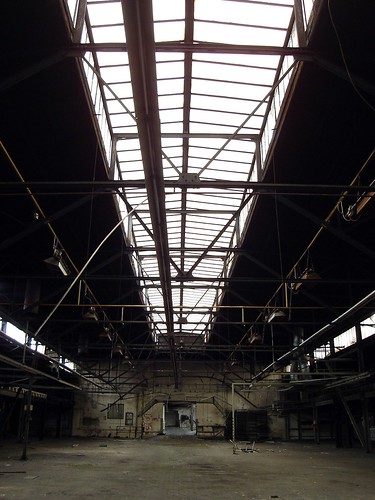
American Urbex focuses largely on urbex locations located in… you guessed it… America. However, the diverse urbex community is not limited to just the United States. All over the globe there are wonderful sites explored by thrill seeking photographers, both professional and amateur alike. To borrow some comic-geek parlance, this American Urbex entry is an “origin story.” It explains how I got my start in the urbex community while living in Germany.
A long time ago in a country far, far away…
In 2007 I participated in the Hessen Exchange, which permits Wisconsin UW System college students to study abroad in the German federal state of Hessen. While studying at Philipps-Universität in Marburg an der Lahn, I would sometimes commute to Frankfurt on the weekends. Near the end of my semester abroad I was running out of cash, which meant I was left to my own devices for entertainment. Fortunately I had purchased a Kettler Alu-Rad 2600 (oh how I still miss that bicycle), and with my Philipps ID could ride anywhere in Hessen for free on the Deutsche Bahn. One of the stops between Frankfurt and Marburg was a place my father had been stationed in the military decades prior, Butzbach. One day, on a whim, I decided I would get off the train and ride around. I spent most of the day in the sweltering summer sun riding around without aim or purpose until I had my fill. When it was time to leave I made my way back to the train station, only to discover the next ride home would depart in well over a half hour. I decided to get back on my bike and ride across the tracks and there it was.
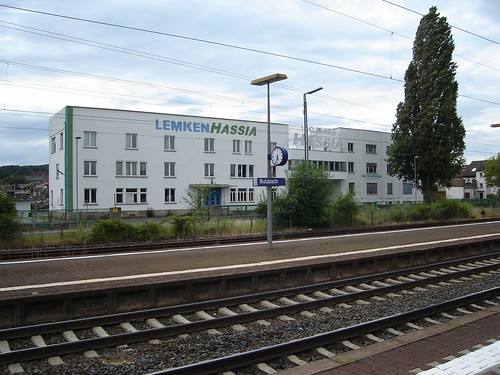
The front office building had broken windows. A large portion of the property had been demolished, but it looked as though it hadn’t been touched in a long time. The fences surrounding the complex were wide open. What the hell, I thought to myself, what do I have to lose? I locked my bike up and made my way into the sprawling Hassia Landmaschinenfabrik.
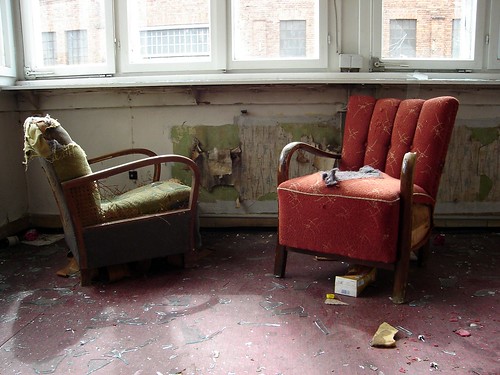
Over the next few hours I cautiously made my way through the complex buildings. The enormity of it all ramped up my adrenaline levels. I wanted to see it all, but didn’t know where to begin. Luckily I had enough presence of mind to take out my diminutive Sony DSC-L1 camera and start snapping away. Something snapped the right synapses in my head and made a connection between adventure, aesthetic beauty, and decay. Up to this point I had no prior knowledge that there was a name for this sort of thing: urban exploration.

There were so many different and varied environments at the Hassia Landmaschinenfabrik and each individual one told a story. At the forefront of complex were the offices. Rummaging through old invoices I was able to discern that the factory made heavy farm implements. The most recent dates were in the mid-1990’s. Phone directories, internal memos, backups of what I assume were important data files were littered in a single corner. This was all that remained of whatever administrative activities occurred at this place.
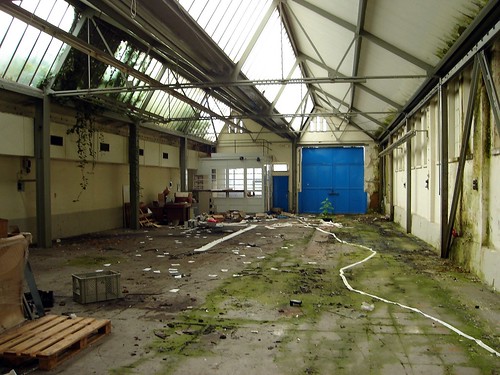
Behind the administration areas were even large buildings that stood mostly empty. All that remained here were massive steel machines too heavy to move. The behemoths stood like dormant monuments to the sweat poured by numerous laborers that toiled beneath them.

The stacks on the second floor had a dense wood musk to them. Among the rows I found a number of identification cards for an American soldier. It made me realize that although this place had been long abandoned, there were others just like me who explored this place.
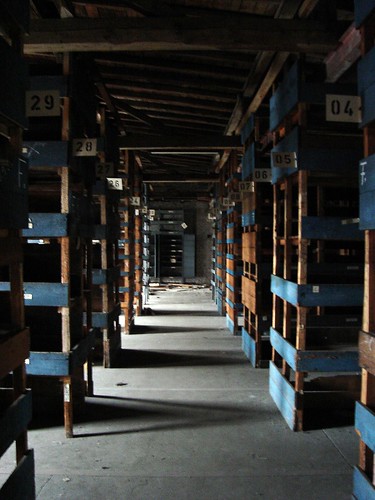
When going through the factory I tried to snap as many photos as I possibly could to document everything. There was no way I’d be returning to this place in the near future. I managed to fill up my camera’s 1gb flash card rather quickly.
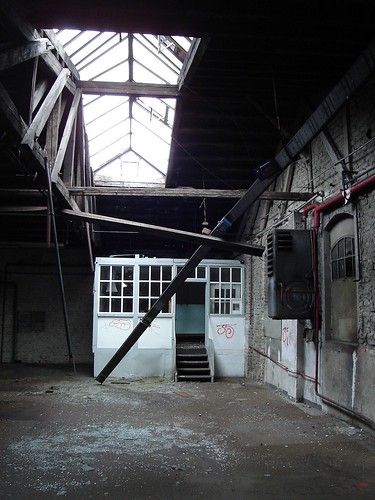
While wandering the empty factory I lost complete track of time. I had spent many hours around Frankfurt’s Museumsinsel, an area of the city densely packed with all kinds of museums. But the Hassia Landmaschinenfabrik enraptured me like nothing else. Eventually though, my camera batteries ran out and it was time to leave. I boarded the Deutsche Bahn back to Marburg an der Lahn, took the bus home, put my bike away, and fell into bed.
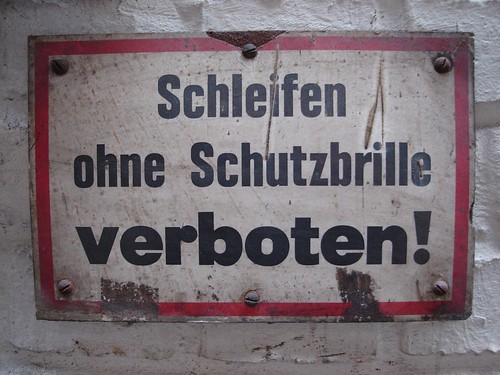
Translation: Grinding without protective eyewear is forbidden!
When I awoke the only thing I could think about was processing the pictures and getting them uploaded to Flickr. Once they were up there the response was immediate.
How did you find this place?
What made you want to go in there?
What if you got hurt?
Are you crazy?
It was then I learned that there is a social component to urbex. There is the urbex community which find this subject matter engaging. Then there is average person who is oddly repulsed, but simultaneously attracted to the photos that urbexers create.
We live in a time where safety and security has been taken to extremes. Playgrounds in America cannot have wood chips because a kid might get a splinter. Working in a college environment I have to deal with “helicopter parents” hover over their adult children. Schools have begun to ban soda because for fear of diabetes, obesity, and caffeinated kids. Cities have health ordinances that prevent enterprising children from running a lemonade stand. Toys are constantly recalled because children manage to somehow hurt themselves. Our society is constantly reengineering public and private spaces to minimize the risk of potential injury.
I think that urbex photography is attractive to the viewer because it is so taboo. Entering abandoned property is a dangerous activity that contradicts societal rules for safety that we grow up with. We’re taught to stay away from such places. That’s not to say urbexers do not take safety seriously. On the contrary, SAFETY is taken very serious by urbexers. Urbexers must practice safety methods in order to experience these places and get out in one piece.
With that my English explanation of how I got involved in urbex comes to an end. For you German speakers there is this little bit more.
Es würde mich freuen, nach diesen Ort nochmals zu reisen. Ich habe ein kleines Teil meines Harz in Deutschland zurückgelassen. Meine Urbex-Passion wachst mit jedem verlassenen Gebäude, dass ich fotografiere. Und jedes Mal, denke ich an die Hassia Landmaschinenfabrik. Die inspiriert mich.
My Flickr Set: Hassia Landmaschinenfabrik








